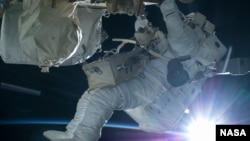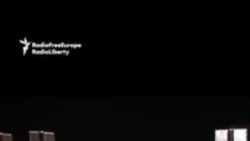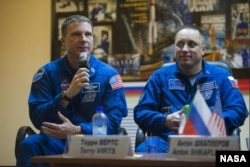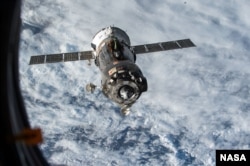A retired US astronaut has told RFE/RL that joint missions with Russia on the International Space Station (ISS) should be scaled back, comparing them to collaboration with Nazi Germany at the height of World War II.
"Cooperating with the Russians on the ISS is like going on an Antarctic expedition with Nazis in 1943," said Terry Virts, a former commander on the station.
"It's just morally reprehensible," he added.
Since Russia's full-scale invasion of Ukraine in 2022, the ISS is one of the rare areas where cooperation between Russia and the West has continued. Astronauts from both NASA and the European Space Agency (ESA) serve alongside cosmonauts from Russian space agency Roscosmos.
Canada and Japan are also involved in what NASA describes "as one of the most complex international collaborations ever attempted."
"The station was designed to be interdependent and relies on contributions from across the partnership to function," NASA says. "No one partner currently has the capability to function without the other."
Virts does not dispute this but calls for cooperation with Russia to be curtailed. Specifically, he said there are two areas where this would be possible and desirable.
Soyuz Versus SpaceX
"We need to stop launching Americans on the Russian Soyuz," he said, and "we shouldn't be launching Russian cosmonauts on our rocket while they're actively destroying our friend and ally, Ukraine."
At present, the business of getting people to and from the ISS is shared. Crews and cargo have been ferried back and forth by Soyuz, SpaceX, and recently also Boeing's new Starliner capsule.
"You still need to operate the space station and you can do that…. It's only going to be in service for another few years," Virts said.
"But I think we should pull back, to say the least."
In a statement provided to RFE/RL, NASA said it flew "integrated crews" with Roscosmos "aboard U.S. crew spacecraft and the Soyuz spacecraft to ensure continued safe operations" of the ISS and its crew.
For Virts, this is a deeply personal issue. His career has been intimately bound up with the ISS. His maiden voyage as a Space Shuttle pilot in 2010 carried the ISS's final permanent modules, including the largest set of windows ever flown in space.
On board the ISS four years later, he witnessed rocket fire in eastern Ukraine as Russian-backed separatists launched an insurgency there. This followed Russian troops seizing Crimea from Ukraine, and Virts says he was shocked by a cosmonaut's response.
"The commander of my Soyuz, Anton Shkaplerov, is from Sevastopol in Crimea. His wife is Ukrainian. And he was like, 'Krym nash, Krym nash,' which means 'Crimea is ours.' He was just so proud that they had taken back Crimea," Virts said.
But later, Virts was more concerned by three other cosmonauts he had flown with -- Aleksander Samokutyaev, Maksim Surayev, and Yelena Surova -- who all went on to serve as lawmakers in President Vladimir Putin's United Russia party.
'I Felt Betrayed'
"You know, I loved the Russian language and the people and the food. I thought the space station can be this great cooperation instead of conflict. And here they are supporting the most evil, blatantly morally abhorrent war. And that was very painful. I felt betrayed," he said.
Samokutyaev is still serving in Russia's State Duma (parliament) and has been sanctioned by Britain, the European Union, and the United States.
The EU sanctions were announced the day after the full-scale invasion, as Samokutyaev had voted to recognize Russian-backed separatist entities in Ukraine as independent states. This was a key move that created the Kremlin's legal pretext for the invasion.
The US Treasury said he and other Duma members were sanctioned "for complicity in Putin's war" due to the vote.
Surayev and Surova are no longer in the Duma but have continued to agitate on behalf of Putin and his aggression in Ukraine.
For instance, Surayev was a surrogate for Putin in his 2024 election campaign. He can be seen in this video in 2024 in Russian-occupied Donetsk. He was reported by Russian media to have spoken during his visit of the role played by cosmonauts in the "special military operation," the Kremlin's preferred term for the full-scale invasion.
Surova is now an adviser to the Moscow regional governor. On March 8, Russian media reported she was ceremonially sending off "aid" to frontline troops in Ukraine, including drones.
"Many committed citizens are helping our defenders by sending vital supplies to the front. Together, we are the only team, a mighty fist, that nobody can defeat," she reportedly said.
A Myth 'Dispelled'
None of these former cosmonauts immediately responded to questions from RFE/RL, including how support for Putin and the war in Ukraine aligns with the humanitarian principles of international cooperation in space.
Virts said they're not speaking to him, either.
"My Ukrainian friends love me. My Russian friends have stopped talking to me," he said.
There is also controversy surrounding a cosmonaut on the current ISS crew. Alexey Zubritsky was born in Ukraine in 1992 and last month RFE/RL's Current Time reported that he was wanted in the land of his birth for treason.
In 2014, Zubritsky was a Ukrainian Air Force pilot stationed in Crimea. When Russian troops arrived, he disobeyed orders to report to a Ukrainian base outside the peninsula, opting instead to stay there and switch sides.
The ISS is due to remain in operation until 2030. Shortly after Russian tanks rolled over the Ukrainian border in 2022, Moscow threatened to withdraw from cooperation on the ISS but later said it would remain involved until 2028.
"We have cooperated very well on the space station. We've made a lot of relationships," said Virts.
"I was on the side of, well, cooperation in space can help things be better on Earth. And man, that myth has been dispelled."
















Forum